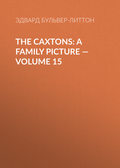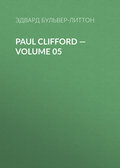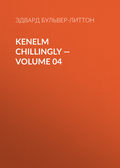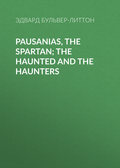
Эдвард Бульвер-Литтон
Night and Morning, Volume 3
"Why, this is lucky! I'm so glad to see you all!" said Arthur Beaufort, with that silver-ringing tone and charming smile which are to the happy spring of man what its music and its sunshine are to the spring of earth. "You must dine with me at Verey's. I want something to rouse me to-day; for I did not get home from the Salon1 till four this morning."
"But you won?"
"Yes, Marsden. Hang it! I always win: I who could so well afford to lose: I'm quite ashamed of my luck!"
"It is easy to spend what one wins," observed Mr. Marsden, sententiously; "and I see you have been at the jeweller's! A present for Cecile? Well, don't blush, my dear fellow. What is life without women?"
"And wine?" said a second. "And play?" said a third. "And wealth?" said a fourth.
"And you enjoy them all! Happy fellow!" said a fifth. The Outcast pulled his hat over his brows, and walked away.
"This dear Paris," said Beaufort, as his eye carelessly and unconsciously followed the dark form retreating through the arches;—"this dear Paris! I must make the most of it while I stay! I have only been here a few weeks, and next week I must go."
"Pooh—your health is better: you don't look like the same man."
"You think so really? Still I don't know: the doctors say that I must either go to the German waters—the season is begun—or—"
"Or what?"
"Live less with such pleasant companions, my dear fellow! But as you say, what is life without—"
"Women!"
"Wine!"
"Play!"
"Wealth!"
"Ha! ha. 'Throw physic to the dogs: I'll none of it!'"
And Arthur leaped lightly on his saddle, and as he rode gaily on, humming the favourite air of the last opera, the hoofs of his horse splashed the mud over a foot-passenger halting at the crossing. Morton checked the fiery exclamation rising to his lips; and gazing after the brilliant form that hurried on towards the Champs Elysees, his eye caught the statues on the bridge, and a voice, as of a cheering angel, whispered again to his heart, "TIME, FAITH, ENERGY!"
The expression of his countenance grew calm at once, and as he continued his rambles it was with a mind that, casting off the burdens of the past, looked serenely and steadily on the obstacles and hardships of the future. We have seen that a scruple of conscience or of pride, not without its nobleness, had made him refuse the importunities of Gawtrey for less sordid raiment; the same feeling made it his custom to avoid sharing the luxurious and dainty food with which Gawtrey was wont to regale himself. For that strange man, whose wonderful felicity of temperament and constitution rendered him, in all circumstances, keenly alive to the hearty and animal enjoyments of life, would still emerge, as the day declined, from their wretched apartment, and, trusting to his disguises, in which indeed he possessed a masterly art, repair to one of the better description of restaurants, and feast away his cares for the moment. William Gawtrey would not have cared three straws for the curse of Damocles. The sword over his head would never have spoiled his appetite! He had lately, too, taken to drinking much more deeply than he had been used to do—the fine intellect of the man was growing thickened and dulled; and this was a spectacle that Morton could not bear to contemplate. Yet so great was Gawtrey's vigour of health, that, after draining wine and spirits enough to have despatched a company of fox- hunters, and after betraying, sometimes in uproarious glee, sometimes in maudlin self-bewailings, that he himself was not quite invulnerable to the thyrsus of the god, he would—on any call on his energies, or especially before departing on those mysterious expeditions which kept him from home half, and sometimes all, the night—plunge his head into cold water—drink as much of the lymph as a groom would have shuddered to bestow on a horse—close his eyes in a doze for half an hour, and wake, cool, sober, and collected, as if he had lived according to the precepts of Socrates or Cornaro!
But to return to Morton. It was his habit to avoid as much as possible sharing the good cheer of his companion; and now, as he entered the, Champs Elysees, he saw a little family, consisting of a young mechanic, his wife, and two children, who, with that love of harmless recreation which yet characterises the French, had taken advantage of a holiday in the craft, and were enjoying their simple meal under the shadow of the trees. Whether in hunger or in envy, Morton paused and contemplated the happy group. Along the road rolled the equipages and trampled the steeds of those to whom all life is a holiday. There, was Pleasure—under those trees was Happiness. One of the children, a little boy of about six years old, observing the attitude and gaze of the pausing wayfarer, ran to him, and holding up a fragment of a coarse kind of cake, said to him, willingly, "Take it—I have had enough!" The child reminded Morton of his brother—his heart melted within him—he lifted the young Samaritan in his arms, and as he kissed him, wept.
The mother observed and rose also. She laid her hand on his own: "Poor boy! why do you weep?—can we relieve you?"
Now that bright gleam of human nature, suddenly darting across the sombre recollections and associations of his past life, seemed to Morton as if it came from Heaven, in approval and in blessing of this attempt at reconciliation to his fate.
"I thank you," said he, placing the child on the ground, and passing his hand over his eyes,—"I thank you—yes! Let me sit down amongst you." And he sat down, the child by his side, and partook of their fare, and was merry with them,—the proud Philip!—had he not begun to discover the "precious jewel" in the "ugly and venomous" Adversity?
The mechanic, though a gay fellow on the whole, was not without some of that discontent of his station which is common with his class; he vented it, however, not in murmurs, but in jests. He was satirical on the carriages and the horsemen that passed; and, lolling on the grass, ridiculed his betters at his ease.
"Hush!" said his wife, suddenly; "here comes Madame de Merville;" and rising as she spoke, she made a respectful inclination of her head towards an open carriage that was passing very slowly towards the town.
"Madame de Merville!" repeated the husband, rising also, and lifting his cap from his head. "Ah! I have nothing to say against her!"
Morton looked instinctively towards the carriage, and saw a fair countenance turned graciously to answer the silent salutations of the mechanic and his wife—a countenance that had long haunted his dreams, though of late it had faded away beneath harsher thoughts—the countenance of the stranger whom he had seen at the bureau of Gawtrey, when that worthy personage had borne a more mellifluous name. He started and changed colour: the lady herself now seemed suddenly to recognise him; for their eyes met, and she bent forward eagerly. She pulled the check-string—the carriage halted—she beckoned to the mechanic's wife, who went up to the roadside.
"I worked once for that lady," said the man with a tone of feeling; "and when my wife fell ill last winter she paid the doctors. Ah, she is an angel of charity and kindness!"
Morton scarcely heard this eulogium, for he observed, by something eager and inquisitive in the face of Madame de Merville, and by the sudden manner in which the mechanic's helpmate turned her head to the spot in which he stood, that he was the object of their conversation. Once more he became suddenly aware of his ragged dress, and with a natural shame—a fear that charity might be extended to him from her—he muttered an abrupt farewell to the operative, and without another glance at the carriage, walked away.
Before he had got many paces, the wife however came up to him, breathless. "Madame de Merville would speak to you, sir!" she said, with more respect than she had hitherto thrown into her manner. Philip paused an instant, and again strode on—
"It must be some mistake," he said, hurriedly: "I have no right to expect such an honour."
He struck across the road, gained the opposite side, and had vanished from Madame de Merville's eyes, before the woman regained the carriage. But still that calm, pale, and somewhat melancholy face, presented itself before him; and as he walked again through the town, sweet and gentle fancies crowded confusedly on his heart. On that soft summer day, memorable for so many silent but mighty events in that inner life which prepares the catastrophes of the outer one; as in the region, of which Virgil has sung, the images of men to be born hereafter repose or glide— on that soft summer day, he felt he had reached the age when Youth begins to clothe in some human shape its first vague ideal of desire and love.
In such thoughts, and still wandering, the day wore away, till he found himself in one of the lanes that surround that glittering Microcosm of the vices, the frivolities, the hollow show, and the real beggary of the gay City—the gardens and the galleries of the Palais Royal. Surprised at the lateness of the hour, it was then on the stroke of seven, he was about to return homewards, when the loud voice of Gawtrey sounded behind, and that personage, tapping him on the back, said,—
"Hollo, my young friend, well met! This will be a night of trial to you. Empty stomachs produce weak nerves. Come along! you must dine with me. A good dinner and a bottle of old wine—come! nonsense, I say you shall come! Vive la joie!"
While speaking, he had linked his arm in Morton's, and hurried him on several paces in spite of his struggles; but just as the words Vive la joie left his lips, he stood still and mute, as if a thunderbolt had fallen at his feet; and Morton felt that heavy arm shiver and tremble like a leaf. He looked up, and just at the entrance of that part of the Palais Royal in which are situated the restaurants of Verey and Vefour, he saw two men standing but a few paces before them, and gazing full on Gawtrey and himself.
"It is my evil genius," muttered Gawtrey, grinding his teeth.
"And mine!" said Morton.
The younger of the two men thus apostrophised made a step towards Philip, when his companion drew him back and whispered,—"What are you about—do you know that young man?"
"He is my cousin; Philip Beaufort's natural son!"
"Is he? then discard him for ever. He is with the most dangerous knave in Europe!"
As Lord Lilburne—for it was he—thus whispered his nephew, Gawtrey strode up to him; and, glaring full in his face, said in a deep and hollow tone,—"There is a hell, my lord,—I go to drink to our meeting!" Thus saying, he took off his hat with a ceremonious mockery, and disappeared within the adjoining restaurant, kept by Vefour.
"A hell!" said Lilburne, with his frigid smile; "the rogue's head runs upon gambling-houses!"
"And I have suffered Philip again to escape me," said Arthur, in self-reproach: for while Gawtrey had addressed Lord Lilburne, Morton had plunged back amidst the labyrinth of alleys. "How have I kept my oath?"
"Come! your guests must have arrived by this time. As for that wretched young man, depend upon it that he is corrupted body and soul."
"But he is my own cousin."
"Pooh! there is no relationship in natural children: besides, he will find you out fast enough. Ragged claimants are not long too proud to beg."
"You speak in earnest?" said Arthur, irresolutely. "Ay! trust my experience of the world—Allons!"
And in a cabinet of the very restaurant, adjoining that in which the solitary Gawtrey gorged his conscience, Lilburne, Arthur, and their gay friends, soon forgetful of all but the roses of the moment, bathed their airy spirits in the dews of the mirthful wine. Oh, extremes of life! Oh, Night! Oh, Morning!
CHAPTER IX
"Meantime a moving scene was open laid,
That lazar house."
—THOMSON'S Castle of Indolence.
It was near midnight. At the mouth of the lane in which Gawtrey resided there stood four men. Not far distant, in the broad street at angles with the lane, were heard the wheels of carriages and the sound of music. A lady, fair in form, tender of heart, stainless in repute, was receiving her friends!
"Monsieur Favart," said one of the men to the smallest of the four; "you understand the conditions—20,000 francs and a free pardon?"
"Nothing more reasonable—it is understood. Still I confess that I should like to have my men close at hand. I am not given to fear; but this is a dangerous experiment."
"You knew the danger beforehand and subscribed to it: you must enter alone with me, or not at all. Mark you, the men are sworn to murder him who betrays them. Not for twenty times 20,000 francs would I have them know me as the informer. My life were not worth a day's purchase. Now, if you feel secure in your disguise, all is safe. You will have seen them at their work—you will recognise their persons—you can depose against them at the trial—I shall have time to quit France."
"Well, well! as you please."
"Mind, you must wait in the vault with them till they separate. We have so planted your men that whatever street each of the gang takes in going home, he can be seized quietly and at once. The bravest and craftiest of all, who, though he has but just joined, is already their captain;—him, the man I told you of, who lives in the house, you must take after his return, in his bed. It is the sixth story to the right, remember: here is the key to his door. He is a giant in strength; and will never be taken alive if up and armed."
"Ah, I comprehend!—Gilbert" (and Favart turned to one of his companions who had not yet spoken) "take three men besides yourself, according to the directions I gave you,—the porter will admit you, that's arranged. Make no noise. If I don't return by four o'clock, don't wait for me, but proceed at once. Look well to your primings. Take him alive, if possible—at the worst, dead. And now—anon ami—lead on!"
The traitor nodded, and walked slowly down the street. Favart, pausing, whispered hastily to the man whom he had called Gilbert,—
"Follow me close—get to the door of the cellar-place eight men within hearing of my whistle—recollect the picklocks, the axes. If you hear the whistle, break in; if not, I'm safe, and the first orders to seize the captain in his room stand good."
So saying, Favart strode after his guide. The door of a large, but ill- favoured-looking house stood ajar—they entered-passed unmolested through a court-yard—descended some stairs; the guide unlocked the door of a cellar, and took a dark lantern from under his cloak. As he drew up the slide, the dim light gleamed on barrels and wine-casks, which appeared to fill up the space. Rolling aside one of these, the guide lifted a trap- door, and lowered his lantern. "Enter," said he; and the two men disappeared.
........
The coiners were at their work. A man, seated on a stool before a desk, was entering accounts in a large book. That man was William Gawtrey. While, with the rapid precision of honest mechanics, the machinery of the Dark Trade went on in its several departments. Apart—alone—at the foot of a long table, sat Philip Morton. The truth had exceeded his darkest suspicions. He had consented to take the oath not to divulge what was to be given to his survey; and when, led into that vault, the bandage was taken from his eyes, it was some minutes before he could fully comprehend the desperate and criminal occupations of the wild forms amidst which towered the burly stature of his benefactor. As the truth slowly grew upon him, he shrank from the side of Gawtrey; but, deep compassion for his friend's degradation swallowing up the horror of the trade, he flung himself on one of the rude seats, and felt that the bond between them was indeed broken, and that the next morning he should be again alone in the world. Still, as the obscene jests, the fearful oaths, that from time to time rang through the vault, came on his ear, he cast his haughty eye in such disdain over the groups, that Gawtrey, observing him, trembled for his safety; and nothing but Philip's sense of his own impotence, and the brave, not timorous, desire not to perish by such hands, kept silent the fiery denunciations of a nature still proud and honest, that quivered on his lips. All present were armed with pistols and cutlasses except Morton, who suffered the weapons presented to him to lie unheeded on the table.
"Courage, mes amis!" said Gawtrey, closing his book,—"Courage!"—a few months more, and we shall have made enough to retire upon, and enjoy ourselves for the rest of the days. Where is Birnie?"
"Did he not tell you?" said one of the artisans, looking up. "He has found out the cleverest hand in France, the very fellow who helped Bouchard in all his five-franc pieces. He has promised to bring him to-night."
"Ay, I remember," returned Gawtrey, "he told me this morning,—he is a famous decoy!"
"I think so, indeed!" quoth a coiner; "for he caught you, the best head to our hands that ever les industriels were blessed with—sacre fichtre!"
"Flatterer!" said Gawtrey, coming from the desk to the table, and pouring out wine from one of the bottles into a huge flagon—"To your healths!"
Here the door slided back, and Birnie glided in.
"Where is your booty, mon brave?" said Gawtrey. "We only coin money; you coin men, stamp with your own seal, and send them current to the devil!"
The coiners, who liked Birnie's ability (for the ci-devant engraver was of admirable skill in their craft), but who hated his joyless manners, laughed at this taunt, which Birnie did not seem to heed, except by a malignant gleam of his dead eye.
"If you mean the celebrated coiner, Jacques Giraumont, he waits without.
You know our rules. I cannot admit him without leave."
"Bon! we give it,—eh, messieurs?" said Gawtrey. "Ay-ay," cried several voices. "He knows the oath, and will hear the penalty."
"Yes, he knows the oath," replied Birnie, and glided back.
In a moment more he returned with a small man in a mechanic's blouse. The new comer wore the republican beard and moustache—of a sandy grey— his hair was the same colour; and a black patch over one eye increased the ill-favoured appearance of his features.
"Diable! Monsieur Giraumont! but you are more like Vulcan than Adonis!" said Gawtrey.
"I don't know anything about Vulcan, but I know how to make five-franc pieces," said Monsieur Giraumont, doggedly.
"Are you poor?"
"As a church mouse! The only thing belonging to a church, since the Bourbons came back, that is poor!"
At this sally, the coiners, who had gathered round the table, uttered the shout with which, in all circumstances, Frenchmen receive a bon mot.
"Humph!" said Gawtrey. "Who responds with his own life for your fidelity?"
"I," said Birnie.
"Administer the oath to him."
Suddenly four men advanced, seized the visitor, and bore him from the vault into another one within. After a few moments they returned.
"He has taken the oath and heard the penalty."
"Death to yourself, your wife, your son, and your grandson, if you betray us!"
"I have neither son nor grandson; as for my wife, Monsieur le Capitaine, you offer a bribe instead of a threat when you talk of her death."
"Sacre! but you will be an addition to our circle, mon brave!" said Gawtrey, laughing; while again the grim circle shouted applause.
"But I suppose you care for your own life."
"Otherwise I should have preferred starving to coming here," answered the laconic neophyte.
"I have done with you. Your health!"
On this the coiners gathered round Monsieur Giraumont, shook him by the hand, and commenced many questions with a view to ascertain his skill.
"Show me your coinage first; I see you use both the die and the furnace. Hem! this piece is not bad—you have struck it from an iron die?—right —it makes the impression sharper than plaster of Paris. But you take the poorest and the most dangerous part of the trade in taking the home market. I can put you in a way to make ten times as much—and with safety. Look at this!"—and Monsieur Giraumont took a forged Spanish dollar from his pocket, so skilfully manufactured that the connoisseurs were lost in admiration—"you may pass thousands of these all over Europe, except France, and who is ever to detect you? But it will require better machinery than you have here."
Thus conversing, Monsieur Giraumont did not perceive that Mr. Gawtrey had been examining him very curiously and minutely. But Birnie had noted their chief's attention, and once attempted to join his new ally, when Gawtrey laid his hand on his shoulder, and stopped him.
"Do not speak to your friend till I bid you, or—" lie stopped short, and touched his pistols.
Birnie grew a shade more pale, but replied with his usual sneer:
"Suspicious!—well, so much the better!" and seating himself carelessly at the table, lighted his pipe.
"And now, Monsieur Giraumont," said Gawtrey, as he took the head of the table, "come to my right hand. A half-holiday in your honour. Clear these infernal instruments; and more wine, mes amis!"
The party arranged themselves at the table. Among the desperate there is almost invariably a tendency to mirth. A solitary ruffian, indeed, is moody, but a gang of ruffians are jovial. The coiners talked and laughed loud. Mr. Birnie, from his dogged silence, seemed apart from the rest, though in the centre. For in a noisy circle a silent tongue builds a wall round its owner. But that respectable personage kept his furtive watch upon Giraumont and Gawtrey, who appeared talking together, very amicably. The younger novice of that night, equally silent, seated towards the bottom of the table, was not less watchful than Birnie. An uneasy, undefinable foreboding had come over him since the entrance of Monsieur Giraumont; this had been increased by the manner of Mr. Gawtrey. His faculty of observation, which was very acute, had detected something false in the chief's blandness to their guest—something dangerous in the glittering eye that Gawtrey ever, as he spoke to Giraumont, bent on that person's lips as he listened to his reply. For, whenever William Gawtrey suspected a man, he watched not his eyes, but his lips.
Waked from his scornful reverie, a strange spell chained Morton's attention to the chief and the guest, and he bent forward, with parted mouth and straining ear, to catch their conversation.
"It seems to me a little strange," said Mr. Gawtrey, raising his voice so as to be heard by the party, "that a coiner so dexterous as Monsieur Giraumont should not be known to any of us except our friend Birnie."
"Not at all," replied Giraumont; "I worked only with Bouchard and two others since sent to the galleys. We were but a small fraternity— everything has its commencement."
"C'est juste: buvez, donc, cher ami!"
The wine circulated. Gawtrey began again:
"You have had a bad accident, seemingly, Monsieur Giraumont. How did you lose your eye?"
"In a scuffle with the gens d' armes the night Bouchard was taken and I escaped. Such misfortunes are on the cards."
"C'est juste: buvez, donc, Monsieur Giraumont!"
Again there was a pause, and again Gawtrey's deep voice was heard.
"You wear a wig, I think, Monsieur Giraumont? To judge by your eyelashes your own hair has been a handsomer colour."
"We seek disguise, not beauty, my host; and the police have sharp eyes."
"C'est juste: buvez, donc-vieux Renard! When did we two meet last?"
"Never, that I know of."
"Ce n'est pas vrai! buvez, donc, MONSIEUR FAVART!"
At the sound of that name the company started in dismay and confusion, and the police officer, forgetting himself for the moment, sprang from his seat, and put his right hand into his blouse.
"Ho, there!—treason!" cried Gawtrey, in a voice of thunder; and he caught the unhappy man by the throat. It was the work of a moment. Morton, where he sat, beheld a struggle—he heard a death-cry. He saw the huge form of the master-coiner rising above all the rest, as cutlasses gleamed and eyes sparkled round. He saw the quivering and powerless frame of the unhappy guest raised aloft in those mighty arms, and presently it was hurled along the table-bottles crashing—the board shaking beneath its weight—and lay before the very eyes of Morton, a distorted and lifeless mass. At the same instant Gawtrey sprang upon the table, his black frown singling out from the group the ashen, cadaverous face of the shrinking traitor. Birnie had darted from the table—he was half-way towards the sliding door—his face, turned over his shoulder, met the eyes of the chief.
"Devil!" shouted Gawtrey, in his terrible voice, which the echoes of the vault gave back from side to side. "Did I not give thee up my soul that thou mightest not compass my death? Hark ye! thus die my slavery and all our secrets!" The explosion of his pistol half swallowed up the last word, and with a single groan the traitor fell on the floor, pierced through the brain—then there was a dead and grim hush as the smoke rolled slowly along the roof of the dreary vault.
Morton sank back on his seat, and covered his face with his hands. The last seal on the fate of THE MAN OF CRIME was set; the last wave in the terrible and mysterious tide of his destiny had dashed on his soul to the shore whence there is no return. Vain, now and henceforth, the humour, the sentiment, the kindly impulse, the social instincts which had invested that stalwart shape with dangerous fascination, which had implied the hope of ultimate repentance, of redemption even in this world. The HOUR and the CIRCUMSTANCE had seized their prey; and the self-defence, which a lawless career rendered a necessity, left the eternal die of blood upon his doom!
"Friends, I have saved you," said Gawtrey, slowly gazing on the corpse of his second victim, while he turned the pistol to his belt. "I have not quailed before this man's eye" (and he spurned the clay of the officer as he spoke with a revengeful scorn) "without treasuring up its aspect in my heart of hearts. I knew him when he entered—knew him through his disguise—yet, faith, it was a clever one! Turn up his face and gaze on him now; he will never terrify us again, unless there be truth in ghosts!"
Murmuring and tremulous the coiners scrambled on the table and examined the dead man. From this task Gawtrey interrupted them, for his quick eye detected, with the pistols under the policeman's blouse, a whistle of metal of curious construction, and he conjectured at once that danger was at hand.
"I have saved you, I say, but only for the hour. This deed cannot sleep. See, he had help within call! The police knew where to look for their comrade—we are dispersed. Each for himself. Quick, divide the spoils! Sauve qui peat!"
Then Morton heard where he sat, his hands still clasped before his face, a confused hubbub of voices, the jingle of money, the scrambling of feet, the creaking of doors. All was silent!
A strong grasp drew his hands from his eyes.
"Your first scene of life against life," said Gawtrey's voice, which seemed fearfully changed to the ear that beard it. "Bah! what would you think of a battle? Come to our eyrie: the carcasses are gone."
Morton looked fearfully round the vault. He and Gawtrey were alone. His eyes sought the places where the dead had lain—they were removed—no vestige of the deeds, not even a drop of blood.
"Come, take up your cutlass, come!" repeated the voice of the chief, as with his dim lantern—now the sole light of the vault—he stood in the shadow of the doorway.
Morton rose, took up the weapon mechanically, and followed that terrible guide, mute and unconscious, as a Soul follows a Dream through the House of Sleep!







